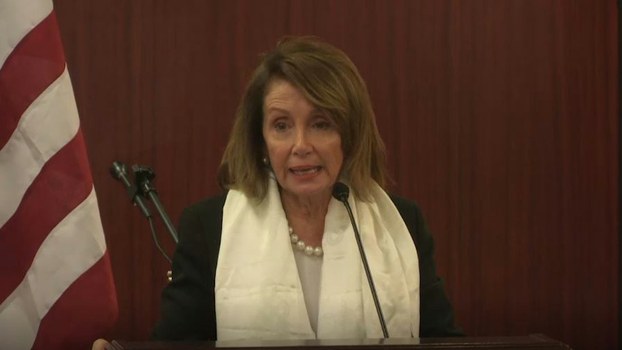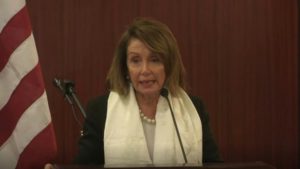Pelosi Signals Strong US Congress Concern Over Uyghur Political ‘Re-education Camps’

Radio Free Asia, 13 February 2019
 Reported by Joshua Lipes – U.S. House Speaker Nancy Pelosi wants Washington to “call out” Beijing for its mass incarceration of ethnic Uyghurs in northwest China’s Xinjiang Uyghur Autonomous Region (XUAR), signaling strong concern in Congress, where legislation has been introduced to hold those responsible to account.
Reported by Joshua Lipes – U.S. House Speaker Nancy Pelosi wants Washington to “call out” Beijing for its mass incarceration of ethnic Uyghurs in northwest China’s Xinjiang Uyghur Autonomous Region (XUAR), signaling strong concern in Congress, where legislation has been introduced to hold those responsible to account.
Speaking at an event in Washington on Tuesday commemorating 60 years of exile by Tibetan spiritual leader the Dalai Lama, Pelosi said she had talked with U.S. Secretary of State Mike Pompeo at the conclusion of the U.S. National Prayer Breakfast on Feb. 7 and urged him to bring up the issue of China’s political “re-education camps” in the XUAR with his counterparts in Beijing.
“When I went to the Prayer Breakfast the other day, [U.S. President Donald Trump] talked about religious freedom, and we all applauded … But afterwards, I went up to Secretary Pompeo and I said, ‘how come we’re not talking about the Uyghurs?’ and he said, ‘we should—let’s drum it up,’” Pelosi said.
She said that the camps, where more than 1 million Uyghurs and other Muslim minorities accused of harboring “strong religious views” and “politically incorrect” ideas are believed to have been held since April 2017, are relevant to the situation in Tibet because Tibetans have endured “decades of repression of religion,” and Chinese authorities are now using the same tactics of cultural eradication in the XUAR.
“What has been happening in Tibet now is happening in the Uyghur region of China, and it has to be called out,” Pelosi warned.
“A million Uyghurs in [what is] effectively prison labor camps for the same purpose … assimilation. They want to purge the great individuality of the … culture there.”
According to Pelosi, Washington is obligated to bring up the Uyghur issue, and other examples of religious repression, with Beijing, and “shouldn’t hesitate because of any commercial interest with China.”
“If we don’t, we lose all moral authority to speak about human rights any place in the world,” she added.
Post editorial
Pelosi’s comments came on the same day that the Washington Postpublished an opinion piece by its editorial board calling on the international community to “demand justice” for the Uyghurs and other Muslims detained in camps in the XUAR.
The Post cited a rare statement of criticism against China from a majority Muslim nation issued by Turkey over the weekend, urging authorities to close the camps, and saying it had been prompted to act, in part, by reports of the death in prison of prominent Uyghur musician Abdurehim Heyit, who had served two years of an eight-year jail sentence “for one of his songs.”
On Sunday, Chinese state media published a video online that purportedly shows Heyit alive, and in which the musician claims he is “in the process of being investigated for allegedly violating the national laws,” and China’s embassy in Ankara called Turkey’s statement “completely against the truth.”
But the Post’s editorial board noted that other nations, “fearful of Chinese bullying and eager to preserve economic ties, have been slow to condemn or even acknowledge this ongoing crime against humanity,” and urged additional governments to speak out against what it called “cultural genocide” in the XUAR.
“China must be held to account” for crimes against the Uyghurs, the article said, adding that “the time has come for the rest of the world to demand admission to the camps, in search of a lost Uyghur musician and more than 1 million others.”
Proposed legislation
The Post specifically mentioned the bipartisan “Uyghur Human Rights Policy Act,” put forward last month by U.S. Senators Marco Rubio of Florida and Bob Menendez of New Jersey, which would dedicate new resources from the U.S. State Department, FBI, and other intelligence agencies to documenting abuse of Uyghurs and other ethnic Muslims in the XUAR, as well as Beijing’s intimidation of U.S. citizens and residents on American soil.
The “Uyghur Human Rights Policy Act” would require the Director of National Intelligence to issue a report in coordination with the State Department on the security threat posed by China’s crackdown on the Uyghurs, as well as a list of Chinese companies involved in the construction and the operation of re-education camps in the XUAR.
The act calls for “high-level U.S. engagement” on the issue, as well as the application of travel and financial sanctions against Chinese officials who are responsible for the policies in the XUAR under the Global Magnitsky Human Rights Accountability Act.
Last month marked the second time legislation aimed at holding China accountable for its treatment of the Uyghurs was proposed, following the announcement of a similar act in November 2018, which was not taken up by the Senate before the end of the congressional session.
At the time, China’s Ambassador to the U.S. Cui Tiankai threatened retaliation if Washington sanctions Beijing over human rights abuses in the XUAR, telling Reuters news agency in an interview that China is working to “re-educate” terrorists and should not be punished for what he suggested is a more humane approach to counter-terrorism.
Global Magnitsky Act
U.S. financier Bill Browder, whose campaign to ensure Russian officials involved in the 2008 death in custody of Russian tax lawyer Sergei Magnitsky were held accountable led to Congress passing the Magnitsky Act in 2012, said Wednesday that sanctioning Chinese officials under the Global Magnitsky Act—an extrajudicial expansion of the legislation—is the best way to begin holding Beijing responsible for its policies in the XUAR.
Speaking to RFA’s Uyghur Service, the founder and CEO of Hermitage Capital Management called sanctions “the first step in creating consequences,” as those responsible for organizing the camps “may find themselves a little more uncomfortable about it if all of a sudden there are punishments for them.”
“The Magnitsky Act is no ultimate solution for this, but it’s better than the current situation, which is that they just do it without any penalty,” he said.
“The two things that need to happen are transparency and punishment … We need as much information as we can get about what’s going on so that the world can react, and then the world should react with punishments starting with the Magnitsky Act and other types of sanctions as they’re available.”
According to Browder, the threat of sanctions to lower level officials overseeing the camps would have a powerful impact on the system.
“Let’s say the U.S. and Canada sanction the top 15 officials involved in this,” he said.
“This will scare thousands of other officials supporting them, and it may loosen the grip or lessen the terror, because they don’t want to end up becoming sanctioned as well.”
In order to pass the supporting legislation, he said, the Uyghur exile community needs to win “the information war” with China and ensure that individual cases are being heard.
“The key is to find the cases that are the most urgent and get as much information out about them as you can,” he said.
“At the end of the day, the West can only react if they have information. And the more information, the more outrage, and the more outrage, the more consequences.”
Camp network
Though Beijing initially denied the existence of re-education camps, Shohrat Zakir, chairman of the XUAR, told China’s official Xinhua news agency in October 2018 that the facilities are an effective tool to protect the country from terrorism and provide vocational training for Uyghurs.
Reporting by RFA’s Uyghur Service and other media organizations, however, has shown that those in the camps are detained against their will and subjected to political indoctrination, routinely face rough treatment at the hands of their overseers, and endure poor diets and unhygienic conditions in the often overcrowded facilities.
Adrian Zenz, a lecturer in social research methods at the Germany-based European School of Culture and Theology, has said that some 1.1 million people are or have been detained in the camps—equating to 10 to 11 percent of the adult Muslim population of the XUAR.
In November 2018, Scott Busby, the deputy assistant secretary in the Bureau of Democracy, Human Rights and Labor at the U.S. Department of State, said there are “at least 800,000 and possibly up to a couple of million” Uyghurs and others detained at re-education camps in the XUAR without charges, citing U.S. intelligence assessments.
Citing credible reports, U.S. lawmakers Marco Rubio and Chris Smith of the bipartisan Congressional-Executive Commission on China recently called the situation in the XUAR “the largest mass incarceration of a minority population in the world today.”
Reported by Joshua Lipes and Gulchehra Hoja for RFA’s Uyghur Service.
https://www.rfa.org/english/news/uyghur/pelosi-02132019162108.html

